Trilateral Collaboration
South Korean President Lee holds trilateral summit talks with his Japanese and Chinese counterparts to discuss matters of mutual concern
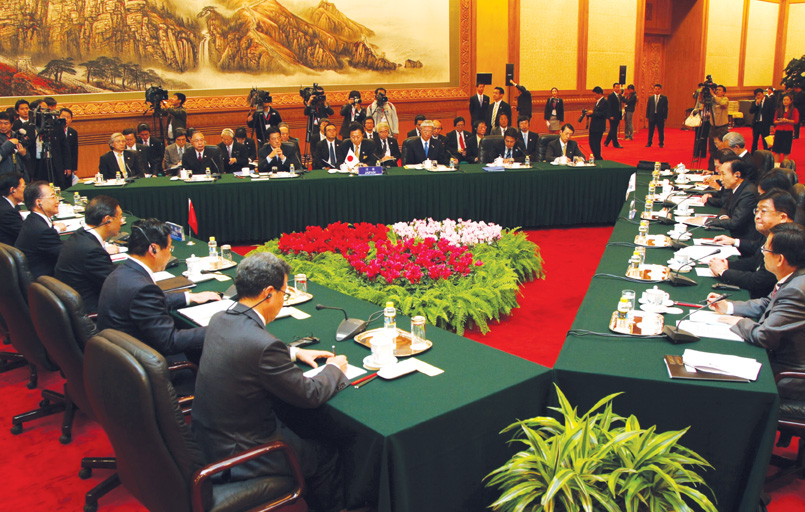 South Korean President Lee Myung-bak held trilateral talks with Chinese Premier Wen Jiabao and Japanese Prime Minister Yukio Hatoyama at the Great Hall of the People in Beijing on Oct. 10 and exchanged views on such issues of mutual interest as North Korea¡¯s nuclear program and ways to promote cooperation among Korea, China and Japan.
South Korean President Lee Myung-bak held trilateral talks with Chinese Premier Wen Jiabao and Japanese Prime Minister Yukio Hatoyama at the Great Hall of the People in Beijing on Oct. 10 and exchanged views on such issues of mutual interest as North Korea¡¯s nuclear program and ways to promote cooperation among Korea, China and Japan.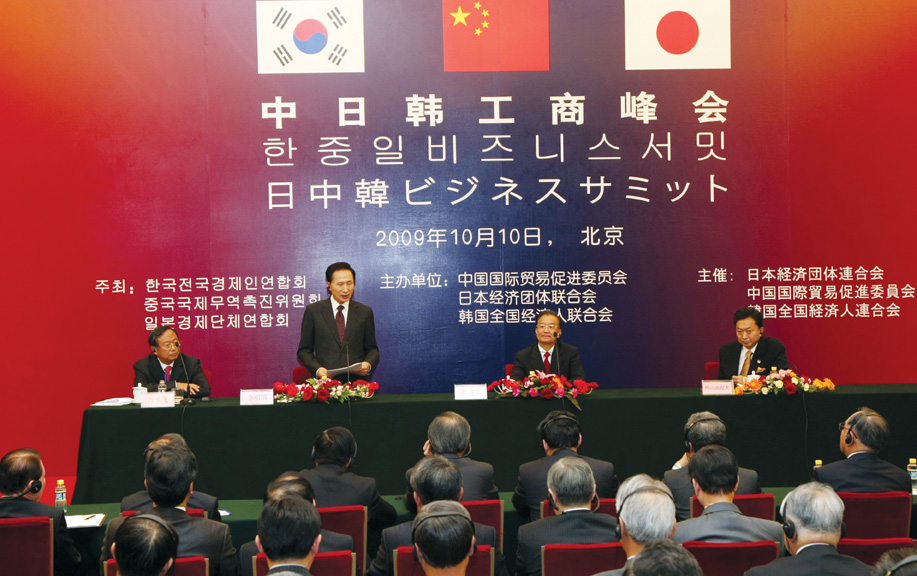
The leaders of the three countries shared the view that trilateral cooperation is essential not only for the common interests of the three countries, but also for ensuring stability and prosperity in both Northeast Asia and the world and adopted a communique commemorating the 10th anniversary of Korea-China-Japan cooperation, containing the outcomes and future vision of the trilateral cooperation, a Cheong Wa Dae spokesman said.
The three countries also adopted a common statement on sustainable development designed to ensure economic growth and balanced development of the environment among the three countries.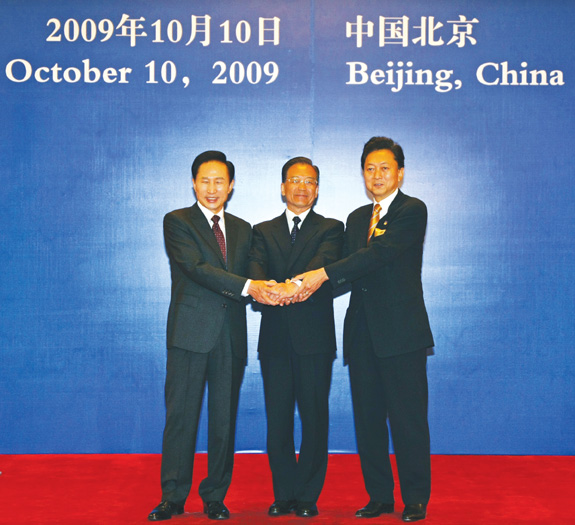
In particular, the Korean, Japanese and Chinese leaders agreed to push for detailed projects to ramp up cooperation among the three countries down the road. The agreement calls for pushing a comprehensive package of next-generation personnel exchange including the reinvigoration of university exchanges and the establishment of youth dialogue channels; the holding of the first Business Summit in Beijing on Oct. 1 designed to discuss ways of expanding trade and investment among businessmen of the three countries; and stepping up cooperation in the aviation safety field among aviation authorities of the three countries.
South Korean President Lee and Japanese Prime Minister Hatoyama praised the Chinese side¡¯s efforts, including Premier Wen¡¯s visit to North Korea, to make headway in the North Korean issue. The leaders of the three countries reaffirmed that the six-party talks on the North Korean nuclear issue is the most effective framework for solving North Korea¡¯s ambitions for nuclear weapons and the solution of the nuclear issue is essential for ensuring peace and stability in Northeast Asia. They also agreed to make joint efforts to resume the six-party talks as soon as possible.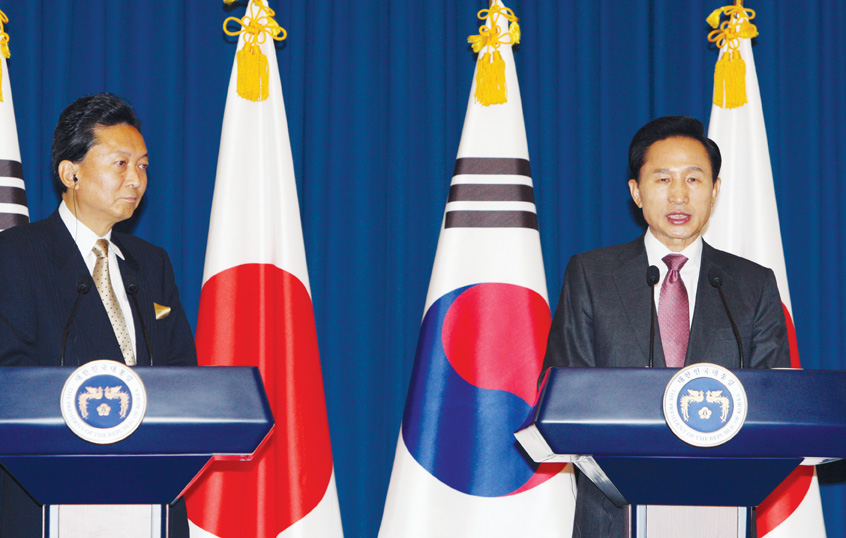
The leaders also had in-depth discussions on such issues as responding to the global financial and economic crisis and climate change.
They assessed that the G-20 Summit in Pittsburgh on Sept. 25 succeeded in reaching consensus on such agreements as macroeconomic collaboration and principal agreements on exit strategies. The three also agreed to closely cooperate in making the G-20 Summit Talks slated for December 2010 in Korea a success. They also assessed that the U.N. Climate Change Summit held on Sept. 22 has built political momentum to conclude climate change negotiations
The latest trilateral talks were the second since last December when the leaders of the three countries held talks in Fukuoka, Japan. They agreed to hold the next trilateral talks in Korea.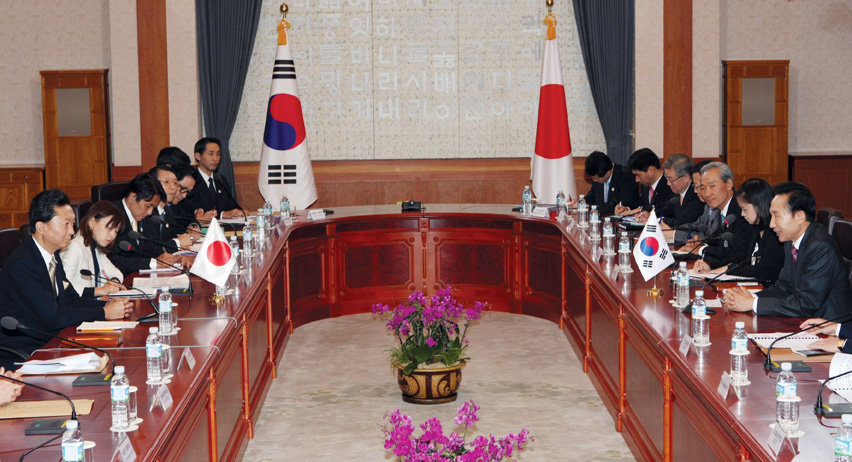
The latest summit talks followed Chinese Prime Minister Wen¡¯s visit to Pyongyang, North Korea during which he held talks with North Korean leader Kim Jong-il on Oct. 4, who reportedly showed a willingness to return to bilateral and multilateral talks over the nuclear standoff.
¡°North Korea wants improved relations with South Korea and Japan,¡± the Chinese premier was quoted as saying at a joint news conference following the trilateral talks. ¡°The opportunity may disappear if we fail to seize it,¡± he added.
The South Korean president urged the countries to quickly come up with a package of incentives for the North that could be included in his proposed ¡°grand bargain,¡± which aims to irreversibly dismantle the Stalinist state¡¯s key nuclear capabilities in a single step rather than in stages.
The Chinese premier and the Japanese prime minister showed an affirmative response to Lee¡¯s proposal, Cheong Wa Dae officials said.President Lee to Visit Southeast Asia
President Lee Myung-bak will visit the Southeast Asian nations of Vietnam, Cambodia and Thailand from Oct. 20 to 25, Cheong Wa Dae said on Oct. 14. First Lady Kim Yoon-ok will accompany the president.
From Oct. 20 to 23, the President will make a state visit to Vietnam and Cambodia, in that order, and then fly to Hua Hin, Thailand, to attend the Korea-ASEAN summit, the ASEAN+3 Summit, and the East Asia Summit (EAS), which will take place on Oct. 24 and 25, said his office.
By making this Southeast Asian tour, the Korean government is expected to boost practical cooperation with ASEAN members, which the incumbent administration considers the axis of its ¡°new Asia diplomacy,¡± Cheong Wa Dae said.
The Korea-ASEAN summit in Thailand would further strengthen the cooperative relationships between the two, after the commemorative summit held on Jeju Island in June. President Lee will tackle such important issues as the global financial crisis and climate change with Asian leaders at the first ASEAN+3 and EAS meetings he would attend since his inauguration.
In the Vietnamese capital Hanoi, President Lee will meet with President Nguyen Minh Triet, secretary-general of the Communist Party Nong Duc Manh and Prime Minister Nguyen Tan Dung. In Phnom Penh, Cambodia, he will pay a courtesy call to King Norodom Sihamoni, and have a summit meeting with Prime Minister Hun Sen, according to Cheong Wa Dae. nw
South Korean President Lee Myung-bak holds trilateral talks with Chinese Premier Wen Jiabao and Japanese Prime Minister Yukio Hatoyama in Beijing on Oct. 10.
(from top) South Korean President Lee Myung-bak speaks at the Korea-China-Japan Business Summit in Beijing on Oct. 10,; and Korean President Lee, Chinese Premier Wen and Japanese Prime Minister Hatoyama join hands prior to the trilateral talks in Beijing on Oct. 10,; Korean President Lee and Japanese Prime Minister Hatoyama hold a joint news conference following their summit talks,; Korea and Japan hold extended summit talks on Oct. 9.
Photo by courtesy of the MCST
3Fl, 292-47, Shindang 6-dong, Chung-gu, Seoul, Korea 100-456
Tel : 82-2-2235-6114 / Fax : 82-2-2235-0799